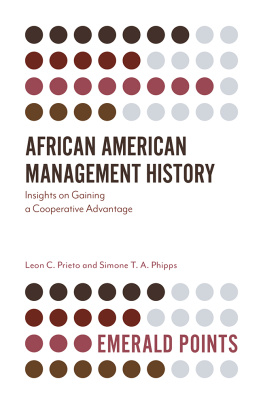LEON C. PRIETO
SIMONE T. A. PHIPPS
Copyright Emerald Publishing Limited, 2019.
No part of this book may be reproduced, stored in a retrieval system, transmitted in any form or by any means electronic, mechanical, photocopying, recording or otherwise without either the prior written permission of the publisher or a licence permitting restricted copying issued in the UK by The Copyright Licensing Agency and in the USA by The Copyright Clearance Center. No responsibility is accepted for the accuracy of information contained in the text, illustrations or advertisements. The opinions expressed in these chapters are not necessarily those of the Author or the publisher.
ACKNOWLEDGMENTS
First, we would like to thank the Almighty Father for blessing us with the inspiration, strength, and resilience to write this book. In addition, we would like to thank our family and friends for their continued support in our professional endeavors. We also wish to convey our appreciation to Emerald and staff for the opportunity, and the support that they provided. A special word of thanks to Kate Collins, Research Services Librarian at Duke University, for helping us locate important primary sources that were essential for this project.
AN INTRODUCTION TO AFRICAN AMERICAN MANAGEMENT THOUGHT
There is a term from the Akan people of Ghana that is known as Sankofa, which means, go back and get it. This is precisely what we should consider doing in order to achieve managerial and entrepreneurial success. In this book, we are asking individuals to consider reflecting on African traditions, and start utilizing some of the philosophies from the past in order to reclaim the future. It is important to learn about, and be proud of African traditions and philosophies because most business schools throughout the world only teach management from an Anglo-Saxon perspective, and highlight the contributions of the white pioneers. This book will attempt to demonstrate that there were individuals of African descent who also made significant contributions, and that African American Management Thought that was practiced during the period 19001930 (otherwise called the golden age of black business by famed historian Dr Juliet Walker), was influenced by traditional African systems of cooperation, and not just by the capitalist economic system. William Clarence Matney (1930), one of the first African American, Harvard Business Graduates (class of 1920), once said that co-operation offers great promise of being the solution for the economic riddle confronting the Negro.
When slavery ended, African Americans were thrust in a world where they needed to understand the tenets of capitalism and a free market economy in a country that did not allow them to be truly free citizens of the United States. The newly emancipated slaves did not possess financial wealth, but many still possessed the knowledge and traditions that were passed down from Africa, including traditional systems of cooperation that were practiced on the continent. Contrary to popular belief, Africans were engaged in trade and other economic activities. They either produced market goods, or operated as traders, brokers, and merchants (Walker, 1998). In addition, the production of goods and trade and marketing activities were propelled by a high degree of both individual and communally based profit-oriented activities (Walker, 1998).
Jaja of Opobo is just one example of a leader who was very entrepreneurial in precolonial Nigeria. He has been described by scholars as perhaps the most enterprising and accomplished of all African merchant princes on the west coast of Africa in the nineteenth century (Fajana & Biggs, 1976). A British palm oil merchant by the name of Alexander Cowan went to the city of Opobo on business and said the following:
There can be no doubt Ja-Ja was the most powerful potentate the Oil Rivers ever produced. He was just as shrewd and fore-seeing as he was powerfulHe could be stern, and he was strict, but he was always just, and the form of government he set up was as near perfect as anything of its kind could be. Every man had the right of appeal, and, though in effect his own authority was never questioned, he conformed to his own rules, and governed through his council of chief. (Pedler, 1974)
Jaja of Opobo is one of Nigerias first modern capitalist and entrepreneurial giants who built a large business empire, and he received praise for his ability in organizing his commercial enterprise (Rotimi & Ogen, 2008). However, in Africa, traditional systems of cooperation played a major role in influencing management and entrepreneurship. According to Nzelibe (1986), African management thought emphasized communalism and cooperative teamwork. This stems from the belief that the individual is not alone, but belongs to the community. For instance, if a misfortune such as death befalls a family, it is viewed as a misfortune not for the family alone, but for the community as a whole (Nzelibe, 1986).
Traditional systems of cooperation existed in almost all African societies, and have remained vibrant even in contemporary times, in particular in rural areas and in the urban informal economy (Schwettmann, 2014). In addition, rotating savings and credit associations such as sou sou (in Ghana and Trinidad and Tobago), partner (in Jamaica), box hand (in Guyana), and chama (in Kenya) are pervasive in Africa and its Diaspora, and involve large numbers of people, usually for the purpose of saving money in order to open small businesses, purchase property and livestock, and fulfill other purposes for which funds are needed. Social capital and trust are of utmost importance since these groups may handle large amounts of cash without any collateral or security and there are usually no written agreements (Schwettmann, 2014).
They often include an element of mutual social assistance in addition to the savings and credit function (Schwettmann, 2014). For example, burial societies, which are a form of micro-insurance, are often found in Southern Africa and Ethiopia. Also, in Cuba during the times of slavery, many enslaved Africans belonged to cabildos (a type of mutual aid society) that provided members with assistance related to healthcare, burial expenses, and religious ceremonies (Concha-Holmes, 2013). The cabildos were an important institution to maintain African traditions and philosophies. Mutual work-sharing schemes for labor-intensive ventures, such as house construction or crop harvesting, can be found everywhere in Africa and its Diaspora. For example, in Trinidad and Tobago, there is a philosophy that is still practiced that came from West Africa known as










